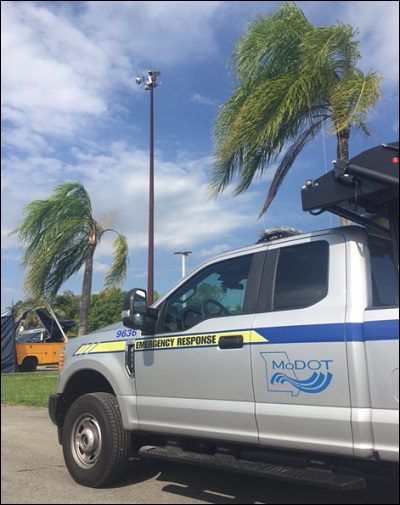As Hurricane Irma was bearing down on Florida with high winds, heavy rains and an unusually wide path of likely destruction, Florida Department of Transportation Secretary Mike Dew reached out Sept. 9 to a network of other state DOT chiefs to see what help they might be able to offer when his crews would be trying to dig out.
The result: A full 16 state DOTs said they could send teams and equipment to help inspect bridges, cut away downed trees blocking roadways and remove debris swept in by the powerful winds and storm surge.
By Sept. 14, FDOT was utilizing the assistance of teams from three of those DOTs while continuing to assess conditions and needs on the ground in case it needed more help from the other 13.
With FDOT’s own employees putting in long hours on the job while many were dealing with their own families’ flood problems, the quick offers of help from fellow DOTs told them that reinforcements were standing by.
“The Florida Department of Transportation appreciates the support of our fellow member states during the Hurricane Irma response effort,” an FDOT official told the AASHTO Journal.
“Currently, 89 workers representing the Delaware, Maryland and Missouri DOTs are deployed in Florida,” the official said. “These workers are assisting in cut-and-toss operations throughout Miami-Dade County. The department also appreciates the 13 additional pending offers from other member states” as FDOT continued assessing the road system to determine future needs.
FDOT Secretary Dew had initially contacted Bud Wright, executive director of the American Association of State Highway and Transportation Officials, who in turn notified the full network of state agency CEOs.
Wright told the state executives that already on Sept. 9 Florida DOT officials were utilizing all available local resources, “so self-contained crews with their own people are their number-one priority” for assistance pledges from other states.
And that’s what they got. At a time when many other states in the Southeast were also bracing for possible disruptions from Irma, and when some suffered heavy flooding in areas, DOTs near and far responded to FDOT’s call.
The FDOT official said out-of-state teams “came equipped with trucks, backhoes, chainsaws, front-end loaders, skid steers and additional equipment support” to help in-state crews battle the debris to reclaim roadway access.
That assistance from state DOTs was part of a much broader response from states, as Florida also requested aid through the Emergency Management Assistance Compact, or EMAC – a mutual support agreement between states.
Some states far from the Southeast as well as others in that region dispatched search-and-rescue teams to help Florida officials save lives, emergency medical teams and ambulances, National Guard troops to augment those already on the ground, utility repair trucks and technicians to help restore power.
The USDOT also responded in various ways across the broader storm zone. Its division offices in each state work with the state DOTs in assessing damage, and the Federal Highway Administration quickly awarded $25 million to help FDOT cover immediate response and repair costs.
And the Federal Aviation Administration supported recovery efforts in the U.S. Virgin Islands by sending a fully staffed mobile air traffic control tower to the Cyril E. King International Airport in St. Thomas. It said that facility’s tower “was badly damaged by the storm, and controllers were managing air traffic from a tent on the airfield for several days before the mobile tower arrived.”
The national transit community also acted to help local providers. Richard White, acting CEO of the American Public Transportation Association, told his members Sept. 12 that more than 45 transit agencies were affected.
“Many of these transit systems are running low on fuel, and are having to operate facilities with temporary generators,” White wrote. “These are difficult work conditions for our colleagues to balance while they begin to get back on their feet.”
White added that the industry had supported employees of hard-hit transit agencies in Texas after Hurricane Harvey struck weeks earlier. “Now, we are joining with FPTA to donate gift cards to affected transit employees in Florida. They have a long way to go, so I hope we can count on your generosity once again.”
As of Sept. 12, a list of impacts on Florida transit agencies showed some staff sheltering in place with their equipment, some out of power or fast running out of fuel, some sharing their fuel with emergency medical staff, one bus operation said it was “providing life sustaining medical transportation only” due to numerous downed power lines around them. Some had pressed to move thousands of people first into shelters, and later back out after roads began to reopen.
Above: Palm trees show a Missouri DOT truck far from home to support Florida‘s Irma response. Photo / FDOT

